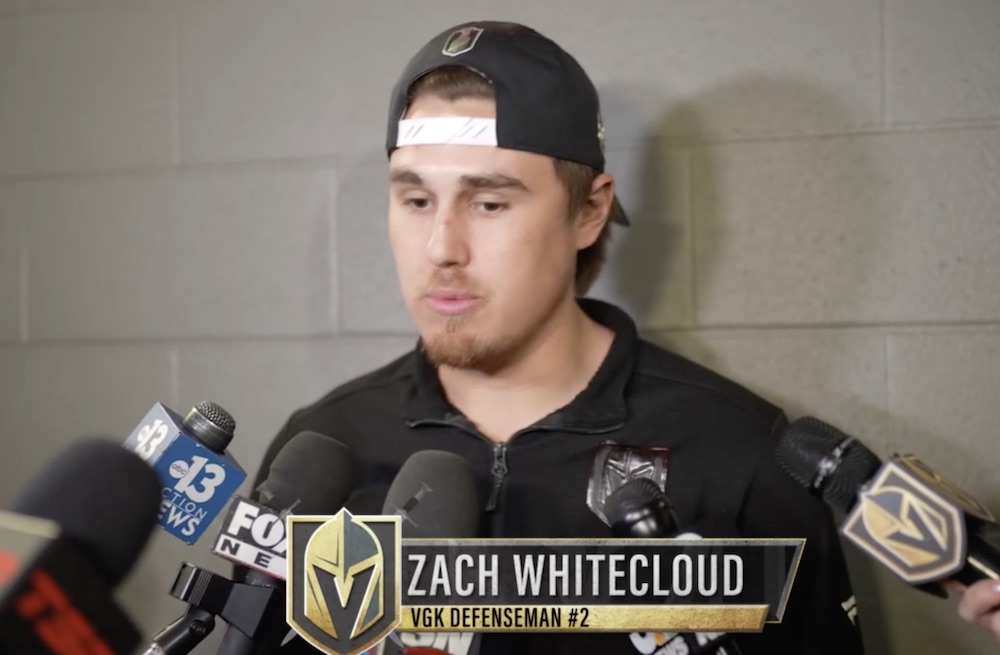
- Details
- By Elyse Wild
Las Vegas Golden Knights defensemen Zach Whitecloud (Sioux) accepted an apology yesterday from ESPN anchor John Anderson, who made a crass comment about the Indigenous hockey player’s last name on air.
During a “SportsCenter” broadcast on Monday recapping the Golden Knights win against the Edmonton Oilers, Anderson, describing the Native American defenseman’s goal, said, “Zach Whitecloud, what kind of name is Whitecloud? Great name if you’re a toilet paper.”
Whitecloud is the first Indigenous NHL player from the Sioux Valley North Dakota Nation.
Anderson issued an apology the next day, saying he should have been more aware of the player’s background. He also reached out to the Golden Knights to personally apologize to Whitecloud.
Anderson's apology statement read: “This is totally on me, and I sincerely apologize to Zach, the Golden Knights, their fans, and everyone else for what I said. It’s my job to be prepared and know the backgrounds of the players, and I blew it. I will be reaching out to the team to personally apologize and hope to have the opportunity to speak to Zach as well.”
In a press availability yesterday, an emotional WhiteCloud told reporters that he accepted Anderson’s apology.
“It was obviously, I think, an attempt at humor that came out as being obviously insensitive, and he acknowledges that. He understands that it was wrong to say, and I wanted to make sure that he knew that. I accepted his apology.”
Whitecloud said he learned about Anderson’s comments from social media and spoke with his family before talking with the ESPN anchor.
“In our culture, we’re raised to be the first ones to reach out and offer our help,” Whitecloud said. “That’s why I reached out to John this morning. And wanted to make sure that he understood that, that I understood that people make mistakes, and he acknowledges that he’s willing, trying to move forward in the right direction and be better from it.”
The Golden Knights defenseman was clearly emotional about the incident with reporters.
“Obviously, I don’t want to be in front of all you (reporters) talking about this. But with that comes an opportunity to allow not just John and myself, but everyone, to learn from this incident,” Whitecloud said, tears welling in his eyes. “To move forward and make sure that these things don’t happen again. And I just want to make that point clear, too — John recognizes that.”
Whitecloud also shared his connection to his culture and the pride that he carries for his ancestors’ name.
“I’m proud of my culture. I’m proud of where I come from, where I was raised, who I was raised by,” Whitecloud said. “I carry my grandfather’s last name, and nothing makes me more proud than to be able to do that.”
In a 2022 Instagram post, Whitecloud shared that his grandfather, grandmother, and uncle are survivors of Canada’s residential school era, when First Nation children were forcibly removed from their homes and placed in boarding schools designed to strip them of their culture.
In that post, Whitecloud wrote: “Reconciliation requires truth, sincerity, and accountability for our words and actions. Reconciliation requires leadership and our individual efforts to speak the truth and acknowledge truth so that we can build a foundation for a relationship. It is our responsibility to be informed and to actively participate in addressing the genocide, the pain and suffering, to commit to a new relationship built on trust.”
Whitecloud is currently playing in his fifth NHL season. He joined Las Vegas in 2018 and signed a six-year, $16.5 million contract extension with the Golden Knights in 2021.
Anderson has been an anchor at ESPN for more than two decades, first joining the network in 1999.
More Stories Like This
Native News Weekly (August 25, 2024): D.C. BriefsNavajo Nation Mourns the Passing of Former Vice President Rex Lee Jim
Deb Haaland Earns Endorsement From Communications Workers of America Local 7076
University Soccer Standout Leads by Example
Two Native Americans Named to Democratic Congressional Campaign Committee's“Red to Blue” Program
Help us defend tribal sovereignty.
At Native News Online, our mission is rooted in telling the stories that strengthen sovereignty and uplift Indigenous voices — not just at year’s end, but every single day.
Because of your generosity last year, we were able to keep our reporters on the ground in tribal communities, at national gatherings and in the halls of Congress — covering the issues that matter most to Indian Country: sovereignty, culture, education, health and economic opportunity.
That support sustained us through a tough year in 2025. Now, as we look to the year ahead, we need your help right now to ensure warrior journalism remains strong — reporting that defends tribal sovereignty, amplifies Native truth, and holds power accountable.
 The stakes couldn't be higher. Your support keeps Native voices heard, Native stories told and Native sovereignty defended.
The stakes couldn't be higher. Your support keeps Native voices heard, Native stories told and Native sovereignty defended.
Stand with Warrior Journalism today.
Levi Rickert (Potawatomi), Editor & Publisher

